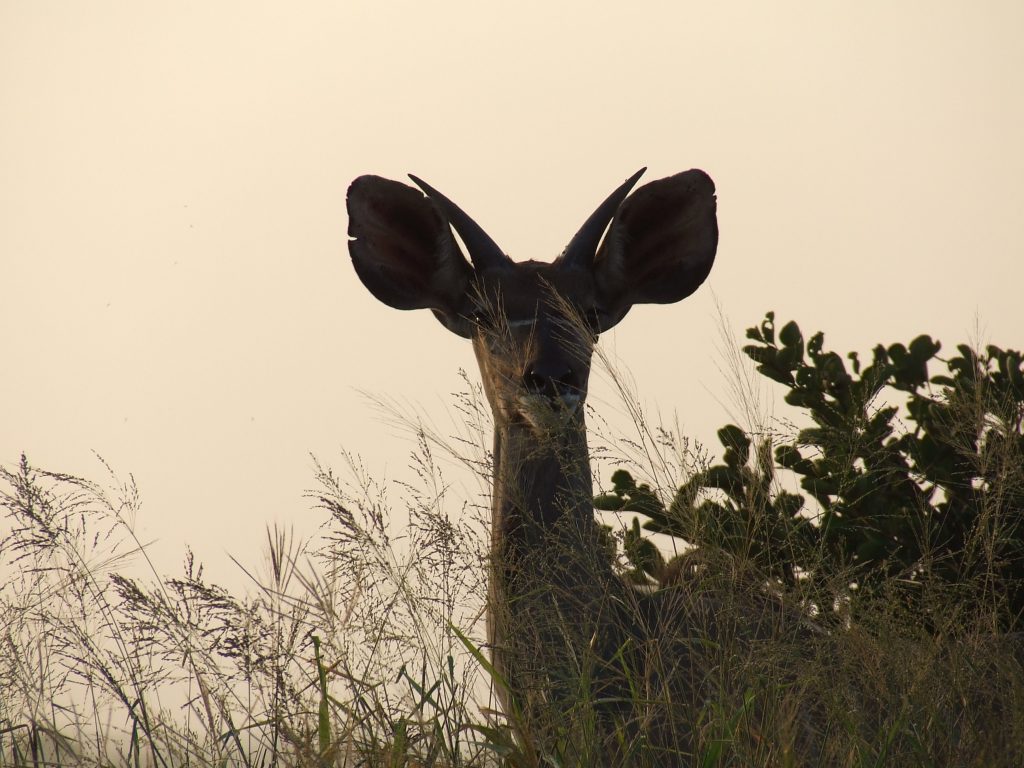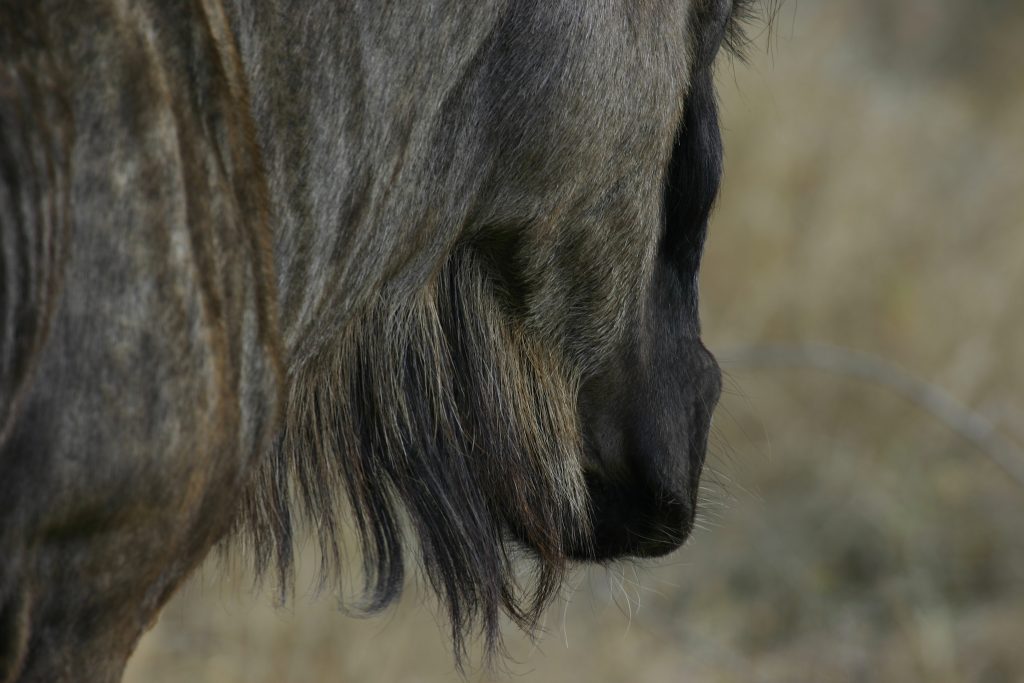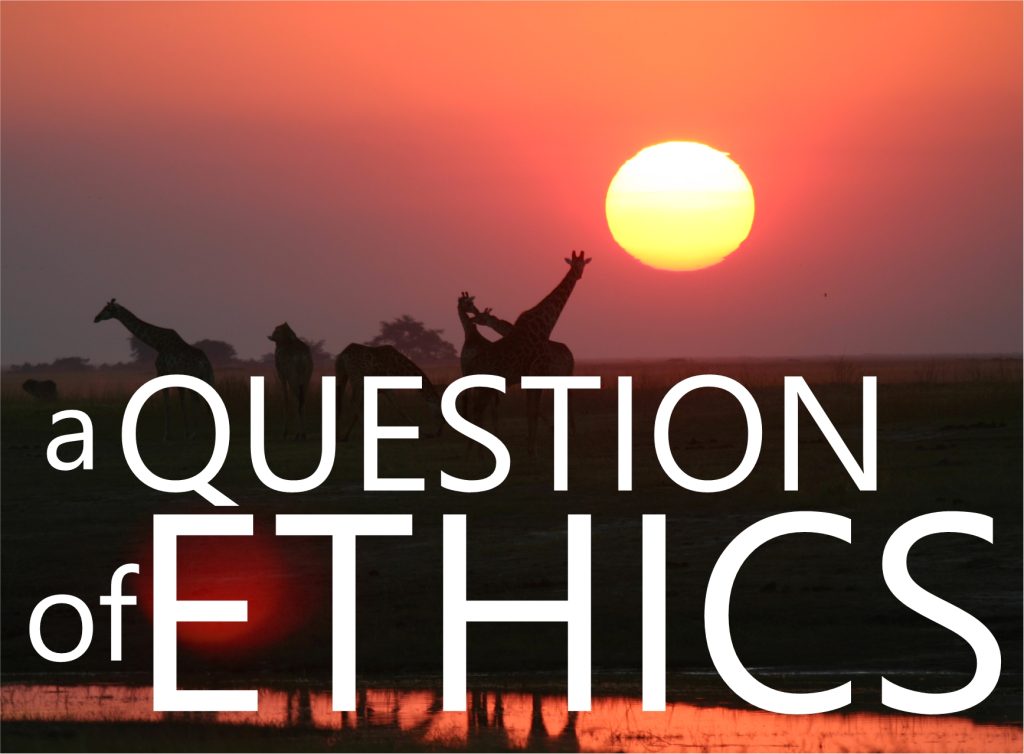We are strange creatures are we not? We are inclined to avoid issues that sometimes nag at our consciences and brush them off much as we would an unwelcome visitor. Yet this visitor has a habit of returning uninvited, arriving suddenly and unexpectedly to again confront us.
I often wonder about and have tried to pin down what is the very essence of hunting ethics. Much has been said and written about being “sportsmanlike” and fair chase and what constitutes acceptable and unacceptable hunting behavior with respect to the animal being hunted. But most of what has been written about what is ethical and what is not tends to skirt around and evade the real issues at hand and couches things hard to confront in language that tends to fall softer on the conscience using words such as hunting, culling, or harvesting as an alternative to the most unsettling word of all… “killing”.

And so we hear of rangers “culling” elephants, or game farm managers “harvesting” surplus game, or hunters “hunting their quarry”. By using “softer” words we fool ourselves into what might be described as “reality denial” and the result is that our ethics are sometimes questionable.
To get to the point where we can identify the very essence of what a hunting ethic should be we have to allow our defences to be broken down so that we can confront what hunters really do. Call it what you like, couch it in whatever terms you choose – terminating life on purpose if the choice to do so is done with forethought and premeditation is – dare I say the word – killing.
We need another and wiser
and perhaps more mystical concept of animals
Remote from universal nature
and living by complicated artifice
Man and civilization surveys the creatures
through the glass of his knowledge
and sees thereby a feather magnified
and the whole image in distortion
We patronize them for their incompleteness,
for their tragic fate
of having taken form so far below ourselves
And therein we err and greatly err
For the animals shall not be measured by man
In a world older and more complete than ours
They move finished and complete
Gifted with the extensions of senses
we have lost or never attained
Living by voices we shall never hear
They are not brethren
They are not underlings
They are other nations
Caught with ourselves in the net of life and time
Fellow prisoners of the splendour
and travail of the earth
Arthur Henry Besten
So wildlife managers do not “cull” elephants, they kill them. Game farmers do not “harvest” surplus game – they kill surplus game. The term “to hunt” is also somewhat ambiguous. You may “hunt” all over the house to find your car keys but to “hunt” an animal we all know goes beyond the idea of looking for or searching for the animal – we know that the hunt culminates in the kill.
Because we are mostly in denial about the word “kill”, we formulate our ethics which, although they may perhaps be related to hunting, actually miss the core value of what our hunting ethic should be. And so we have formulated the creed of “fair chase”.
Let’s look at how the term “fair chase” is defined by some hunting organizations.
“Fair chase is the ethical, sportsmanlike and lawful pursuit and taking of free-ranging wild game animals in a manner that does not give the hunter an improper or unfair advantage over such animals.”
Hmm! Interesting how the words “taking of free game” are again used as an alternative to “killing of free game”. See what I mean! Circular reasoning is used because neither the terms “ethical” or “sportsmanlike” are defined. So the argument goes: ” You are sportsmanlike and ethical because you chase fair and because you chase fair you are ethical and sportsmanlike.” Around and around the argument goes and becomes even more convoluted by the phrase “does not give the hunter an improper or unfair advantage over such animals.”
Hmm! Interesting how the words “taking of free game” are again used as an alternative to “killing of free game”. See what I mean! Circular reasoning is used because neither the terms “ethical” or “sportsmanlike” are defined. So the argument goes: ” You are sportsmanlike and ethical because you chase fair and because you chase fair you are ethical and sportsmanlike.” Around and around the argument goes and becomes even more convoluted by the phrase “does not give the hunter an improper or unfair advantage over such animals.”
What constitutes “unfair advantage” or “being ethical and sportsmanlike?” Now again the inquirer is led astray on a number of rabbit trails. How big should the area be that I hunt animals on? At what range should I attempt the shot and where should I aim? Is it OK to hunt at night with a spotlight? What calibre should I use? Is it ethical to hunt with a longbow? On and on the questions go and we become bogged down ever deeper into the bog of moral confusion because we are not confronting the real issue.
What is the real issue? The real issue is that when you decide to hunt an animal you have mentally taken the moral decision to terminate a life – that is a nice way of saying that you have already taken the decision to kill something – the place and time are, in actual fact, quite irrelevant to the intended outcome.
And now comes the crunch.
If we are indeed as most of us would like to believe, moral creatures, and we do believe in some moral code of ethics, and we are not all masochists that derive some sort of warped pleasure from inflicting unnecessary pain and suffering, then we have to confront the fact that we have made the choice to kill something.

The crux around which everything must now hang is the answer to the question: “How can I kill this animal in the quickest and most humane way possible and cause the least amount of pain and suffering during this animals’ journey from what we know as life to whatever lies beyond?”
That dear friends, fellow conservationists, hunters and wildlife managers is the heart of the matter – the very core issue of a hunting ethic!
It is the question most people conveniently choose to avoid.
- Everything else is a side issue because everything else will hinge around the fulcrum of this question.
- If you wish to ask yourself from what range you should attempt a shot the answer will be found in this question.
- If you wish to know where you should place your shot your answer will also be found in this question.
- If you want to know what calibre to use the answer will be found in this question.
- If you want to know what weapon to use the answer is to be found in this question.
- If you want to know how big the area must be on which to hunt an animal the answer too will be found in this question.
And some of the answers will be unexpected and not what you may want to hear.
To decide to terminate a life and kill something is a big moral step to begin with but because it is the life of a wild animal, we tend to take the decision lightly because we assign far less value to the life of a wild creature. And because we regard them merely as a dispensable resource and assign less value to them we are less perturbed about being their source of pain and suffering. At best we dissociate ourselves from reality at worst we become callous. If we had to make the decision to kill a fellow human being we would be far more circumspect because we assign greater value to human life and we are also more aware of the consequences of taking the life of a fellow human.
A good hunter should not celebrate death but have a profound appreciation for life. We can all kill. We cannot make it alive again. Once the trigger has been squeezed and the bullet is on its way we cannot recall it. It must then do its work of bringing a life to a quick and painless end or causing a crippling and agonizing wound.
The macho attitude of hunters can be very wearisome and disturbing but I think it is all a front.
I would like to think that most hunters after a moment or two of euphoria at having “taken” or “despatched” their quarry may have a moment or two of quiet and private reflection and may experience a sense of regret and deep sorrow at having being instrumental in bringing a life to an untimely end. If there is some sense of this, however fleeting, it is good – not only for the individual – but for hunting as well. If it is missing there is something very wrong with our moral fabric.
If we can dish out pain and suffering and feel no twinge of conscience or experience a sense of remorse, however momentary, then we are on the slippery slope of moral decline, where we have been so desensitized by the violence we see on television, the movies, printed media and perhaps even around us and our claim to be moral creatures, able to decide between right and wrong, good and bad, ethical or non-ethical may well be in jeopardy.
I find it no contradiction in terms that most good hunters end up being the best conservationists – that a time comes in their lives when they have had and seen enough of the blood-letting and dying, and life has taken on new meaning and been elevated to greater importance when they no longer want to see the light of life slowly fading in a kudu’s eye.
Let’s take life seriously and death with reluctance. Making a decision to kill an animal (cull, harvest, hunt) is a big deal. Life is precious. Death (until the Creator brings about changes we cannot effect) is irreversible. The level of suffering an animal experiences as it transitions from life to death lies squarely in the hands of the hunter. The transition may come as quickly and painlessly as the blink of an eye or may drag on agonizingly for hours, days or even weeks.
If our love and appreciation for all things natural, wild and free is indeed genuine and not a façade – then the hunt, the cull or the harvest will remain for us a sad good, perhaps necessary but always accompanied by a sense of irreplaceable loss.

